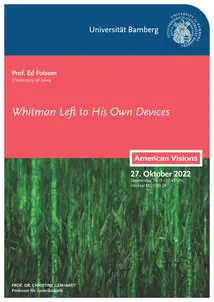Prof. Ed Folsom (University of Iowa): "Whitman Left to His Own Devices"
Thursday, October 27,16:15-17:45
Zoom-Link: https://uni-bamberg.zoom.us/j/63055474308 (opens at 4 p.m. sharp)
When you reach for your smartphone, is your hand reaching for it, or is the device now reaching for your hand, with its alerts, beeps, vibrations, and suddenly glowing screen? Does your hand want it, or does it want your hand? In this talk, Prof. Folsom spoke about Whitman’s most intimate passages, with his claims of a sentient codex in mind, and see how they work to evoke, to enact, the physical interaction between a living reader and a book that responds to that reader. Prof. Folsom built upon the recent critical turn toward the material and the body that manifests itself in new studies on intimacy, materiality, and haptics in literature.
The talk examined what Prof. Folsom calls Whitman’s “erotics of reading,” the way he imagined his material book itself to be a kind of haptics—an early version of a joystick or a smartphone, a technology of touch feedback. He examined Whitman’s own use of haptic diction—touch, tenderness, press—and demonstrate how Whitman has carefully orchestrated a kind of metonymic haptics, creating a book that insists upon the reader’s body materially touching the poet’s body (of work): “I make holy whatever I touch or am touch’d from.” Prof. Folsom probed how Whitman uses deictic words—this, here, now—to point to nothing specific and thus to the one place that these words all magically do point: a moment of now, here, where you are reading this material book, a codex that Whitman has programmed as sentient: “Is this then a touch?” Prof. Folsom looked at what is ultimately most magical in Whitman’s poetry: the way his words, when cast in ink on the face of his pages, insist that they feel the pulse of the reader’s wrist as the physical hand of the reader descends the actual physical printed page, a page that Whitman has programmed to respond to that touch, as happens in his envoi poem “So Long!”:
O how your fingers drowse me,
Your breath falls around me like dew, your pulse lulls the tympans of my ears,
I feel immerged from head to foot,
Delicious, enough.
The talk concluded by examining the way this magic is, in fact, very much an artifice, a device, a kind of artistic con-game as Whitman reveals in his odd and complex “Whoever You Are Holding Me Now in Hand.”
Ed Folsom’s teaching and research have centered on nineteenth- and twentieth-century American poetry and culture. He has been particularly interested in the ways American poets have talked back to Walt Whitman over the years, and how Whitman tapped into American culture in surprising ways to construct a radical new kind of writing. He has written, edited, or co-edited a number of books on Whitman, including Walt Whitman: The Measure of His Song (Choice “Outstanding Academic Book,” Independent Publisher Book Award for Poetry), Walt Whitman's Native Representations (Choice “Outstanding Academic Book”), Walt Whitman and the World, Walt Whitman: The Centennial Essays, Whitman East and West, Whitman Making Books / Books Making Whitman, Leaves of Grass: The Sesquicentennial Essays, Walt Whitman’s Democratic Vistas: The Original Edition, Re-Scripting Walt Whitman (co-authored with Kenneth M. Price), and Walt Whitman’s Song of Myself, with a Complete Commentary (co-authored with Christopher Merrill). (Homepage)
